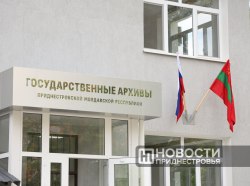Tiraspol, 28 January. /Novosti Pridnestrovya/. Today the Supreme Court of the PMR has held a plenary session on the performance of regular courts in 2015. Besides the Supreme Court judges, the session was attended by the president, government members, heads of municipal and district courts, heads of the Constitution and Arbitration Courts, heads of the Investigation Committee and Procuracy, interior and justice ministers, and a Supreme Council member
Reports of criminal and civil judiciary panels were presented at the session. As was noted by the deputy chair of the Supreme Court, chair of the Criminal Judiciary Panel, Natalya Vlasenko, the terms of criminal cases examination have considerably decreased.
According to her, many municipal and district court judges had no cases at all last year that would take them over three months to hear. There were 51 criminal cases in 2015 against 109 cases in 2010 whose hearings lasted from three to six months. The hearing of another 51 cases took over six months against 135 cases five years ago.
As for the Supreme Court, it is the first time in its history, Natalya Vlasenko emphasised, when there were only three cases left last year whose hearing was carried over to this year. One of them was submitted in December 2015 and has already been heard this month, and two more cases are to be heard on 5 February.
Making his assessment of the work of Pridnestrovian courts, President Shevchuk noted that it had not been uncommon back seven years ago when criminal trials lasted for years.
According to the report by the acting chair of Civil Judiciary Panel of the Supreme Court, Maya Taran, courts failed to observe the procedural deadlines of 371 civil cases against 899 cases in 2014 and 2,812 cases in 2013. It should be noted that this was made possible under judicial staff scarcity and, consequently, the increased workload on judges. The average workload in 2015 was 246 civil cases per judge, whereas in 2014 it was 236 cases.
The absolute record in this respect belongs to the Grigoriopol district court (514 civil cases per judge) which has only three judges at present. The situation is slightly better in the Kamenka and Slobodzeya district courts.
All general courts, including the Supreme Court, are short of judiciary staff. As the Supreme Court chairman, Vladimir Rymar, said in an interview with journalists, the Supreme Court is staffed with judges by 48% only. There must be 41 judges in the court instead of 20 working now.
The military and appeal panels, both criminal and civil, also lack for judiciary staff. There is also an acute issue of the Supreme Court's technical equipment, says Vladimir Rymar. Its minimum requirements were financed by 29% only last year.
Despite all mentioned above, according to the statistics presented in the reports, the quality of case hearings enhanced in 2015 in comparison with previous years. This is testified by the number of reversed judgements. For example, 1.76% of all civil case judgements were recalled in 2014 against 1.35% last year. At the same time, the number of cases appealed to higher authorities rises from year to year.
«The practice when trials could last for several years is gone. This means that the citizens of the Pridnestrovian Moldavian Republic have the right to a fair trial within the time frames established by law. This is the positive result achieved by the judicial branch of power," noted President Yevgeny Shevchuk at the end of the session.












